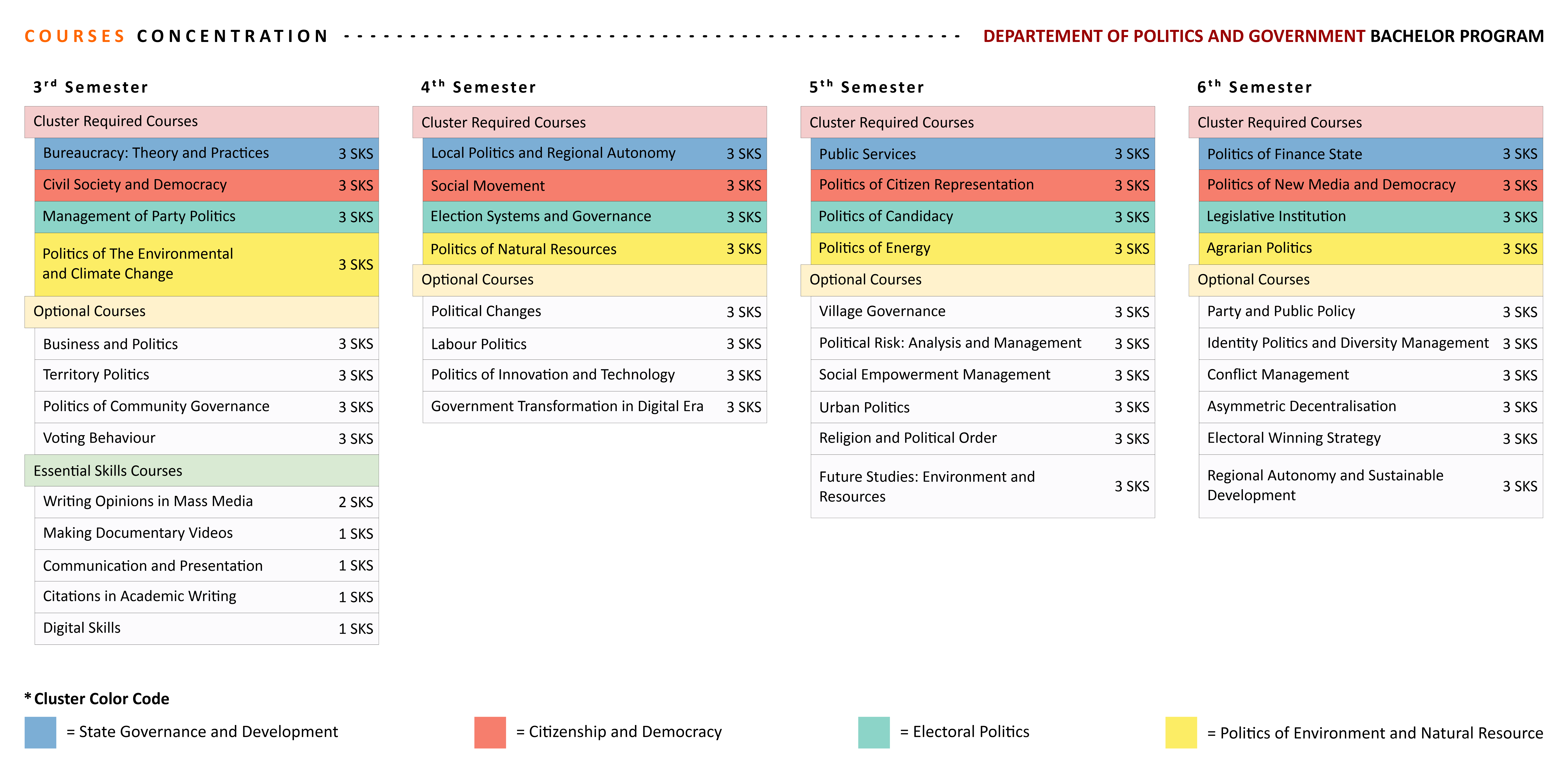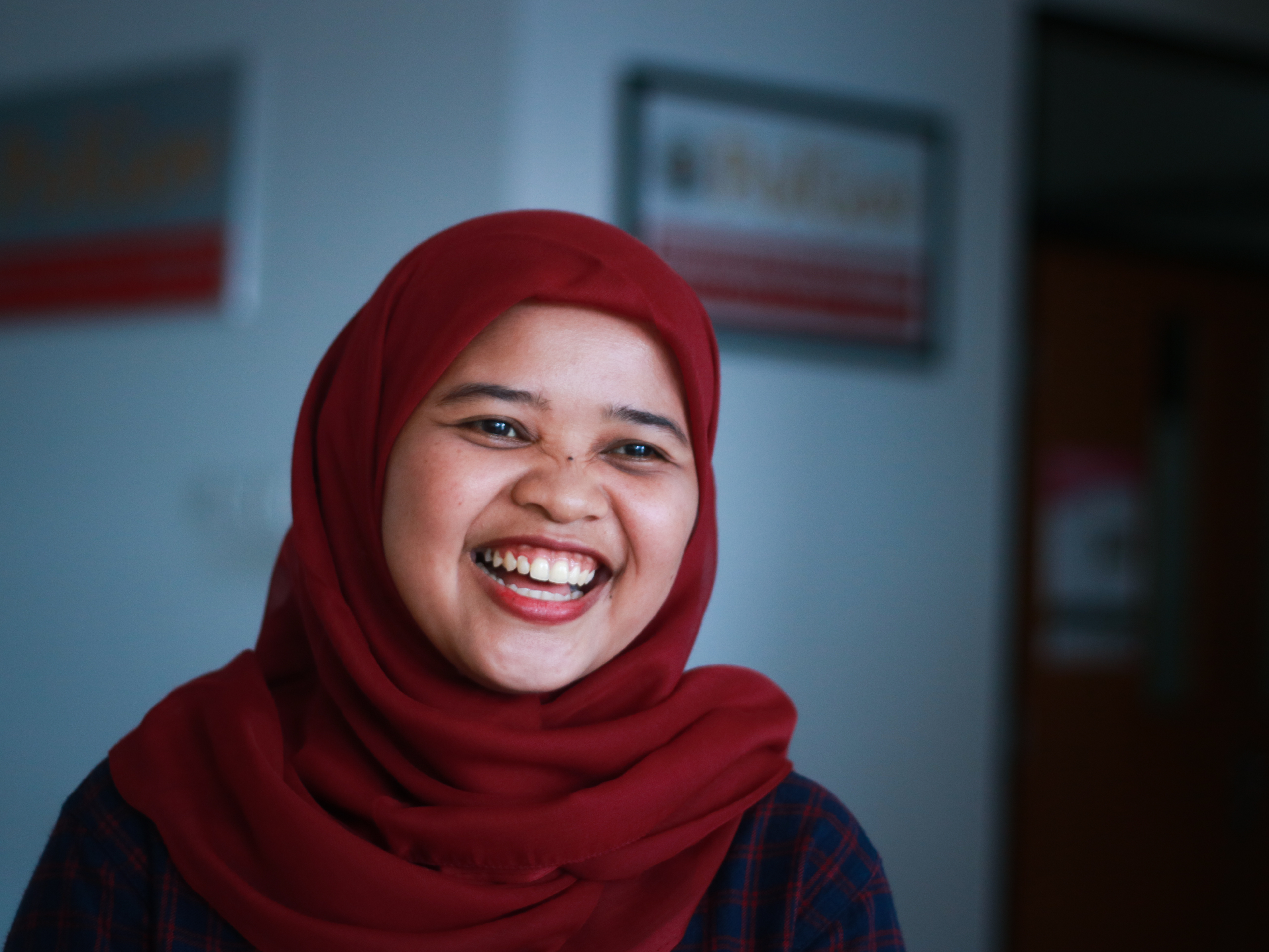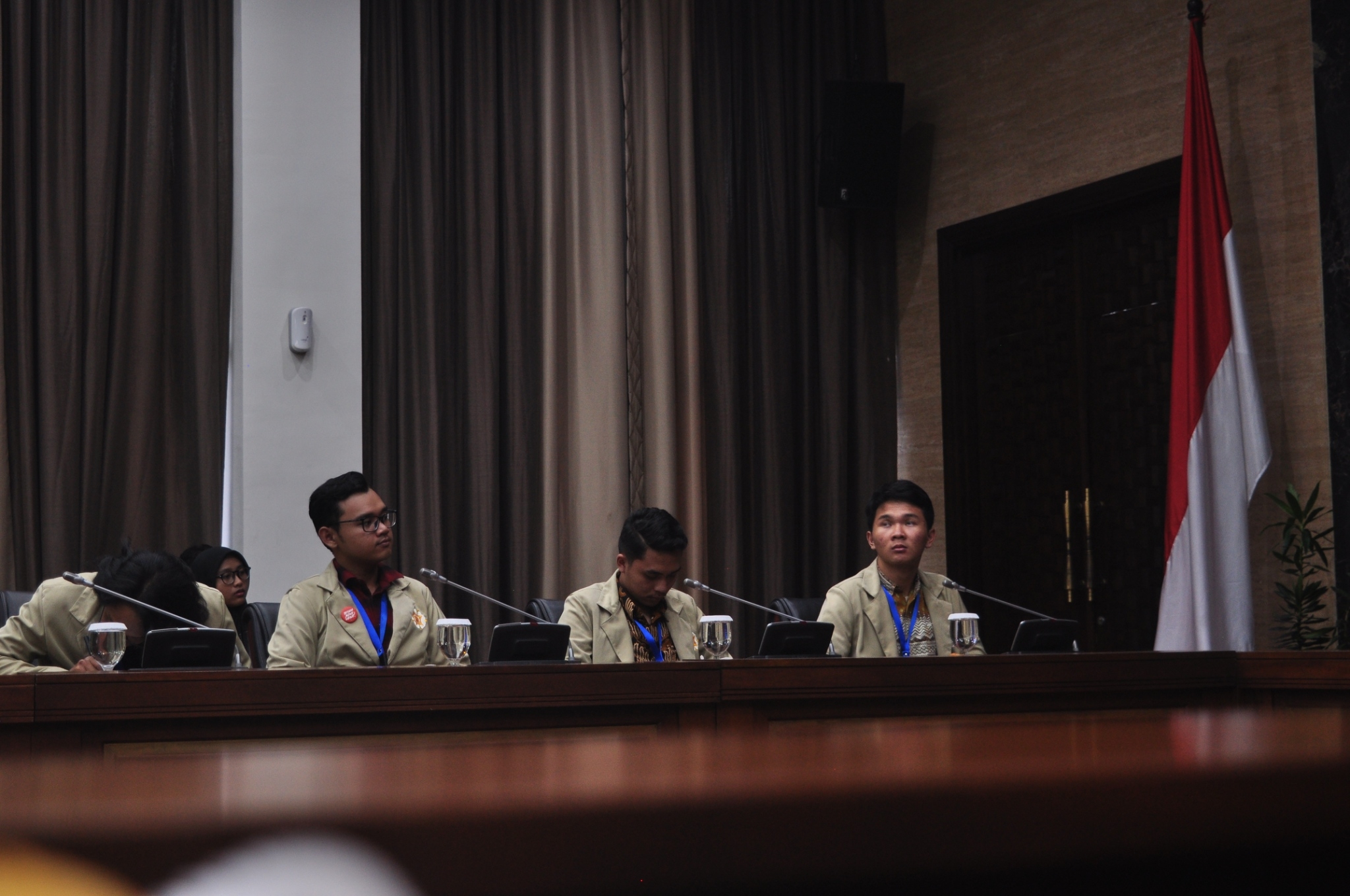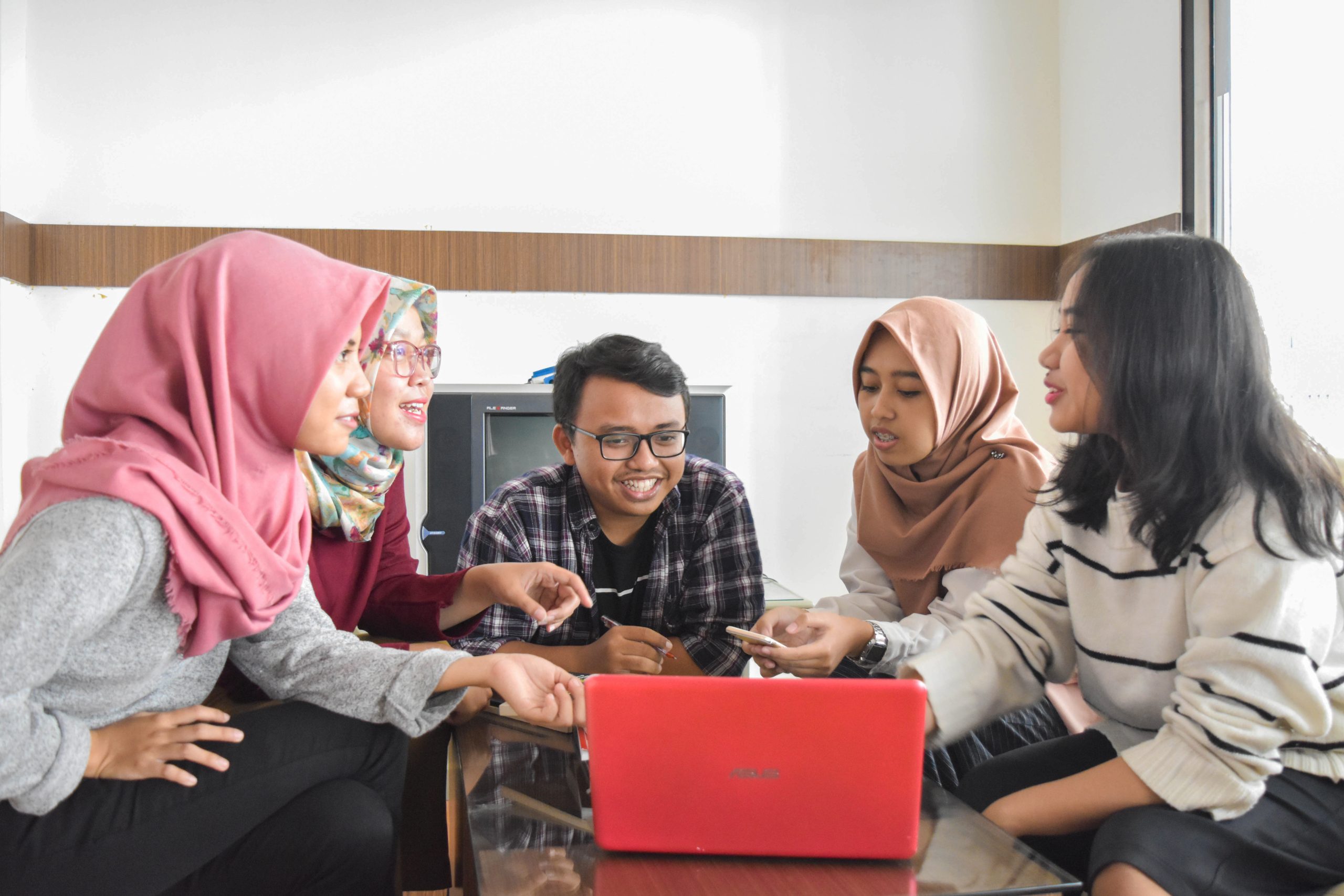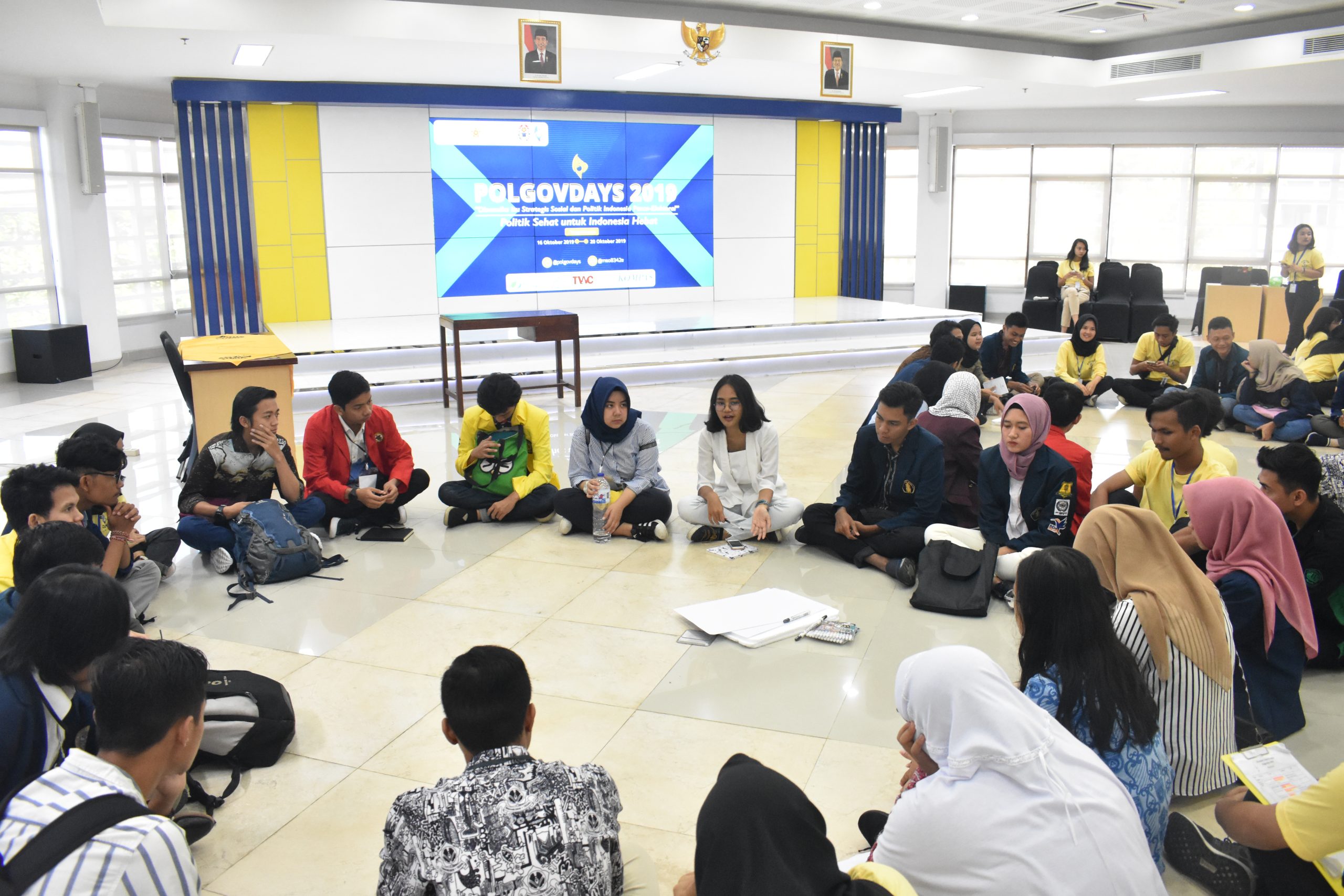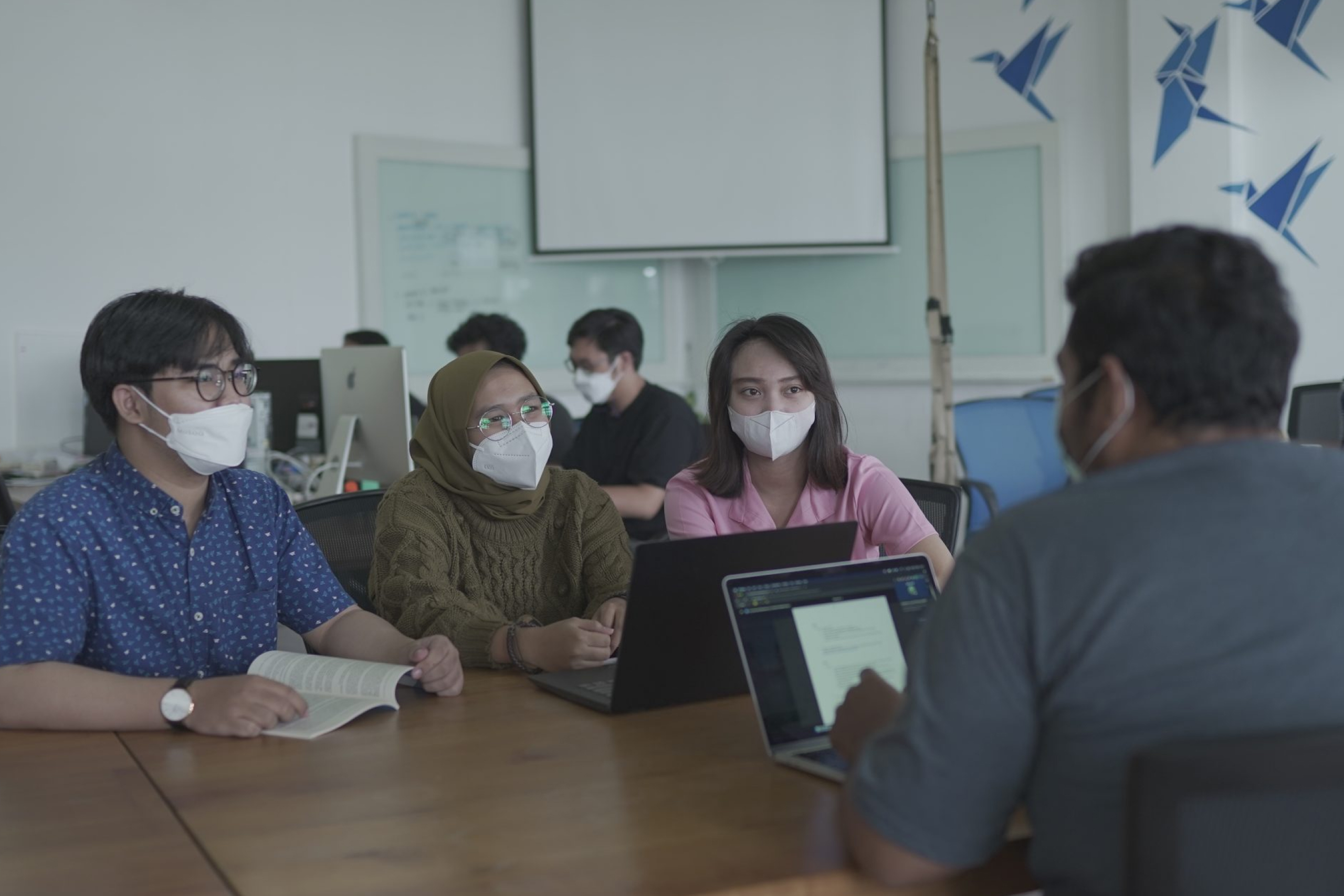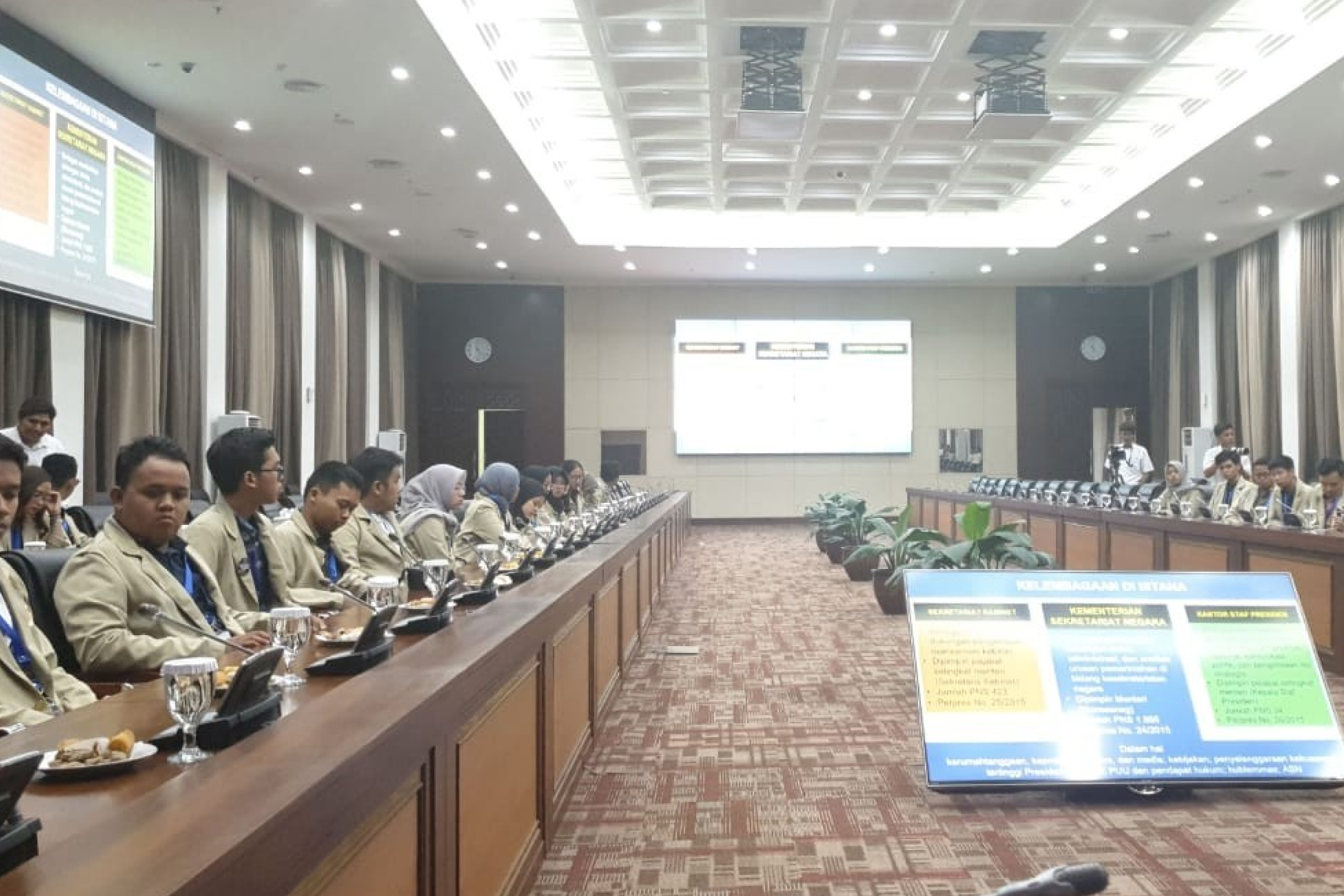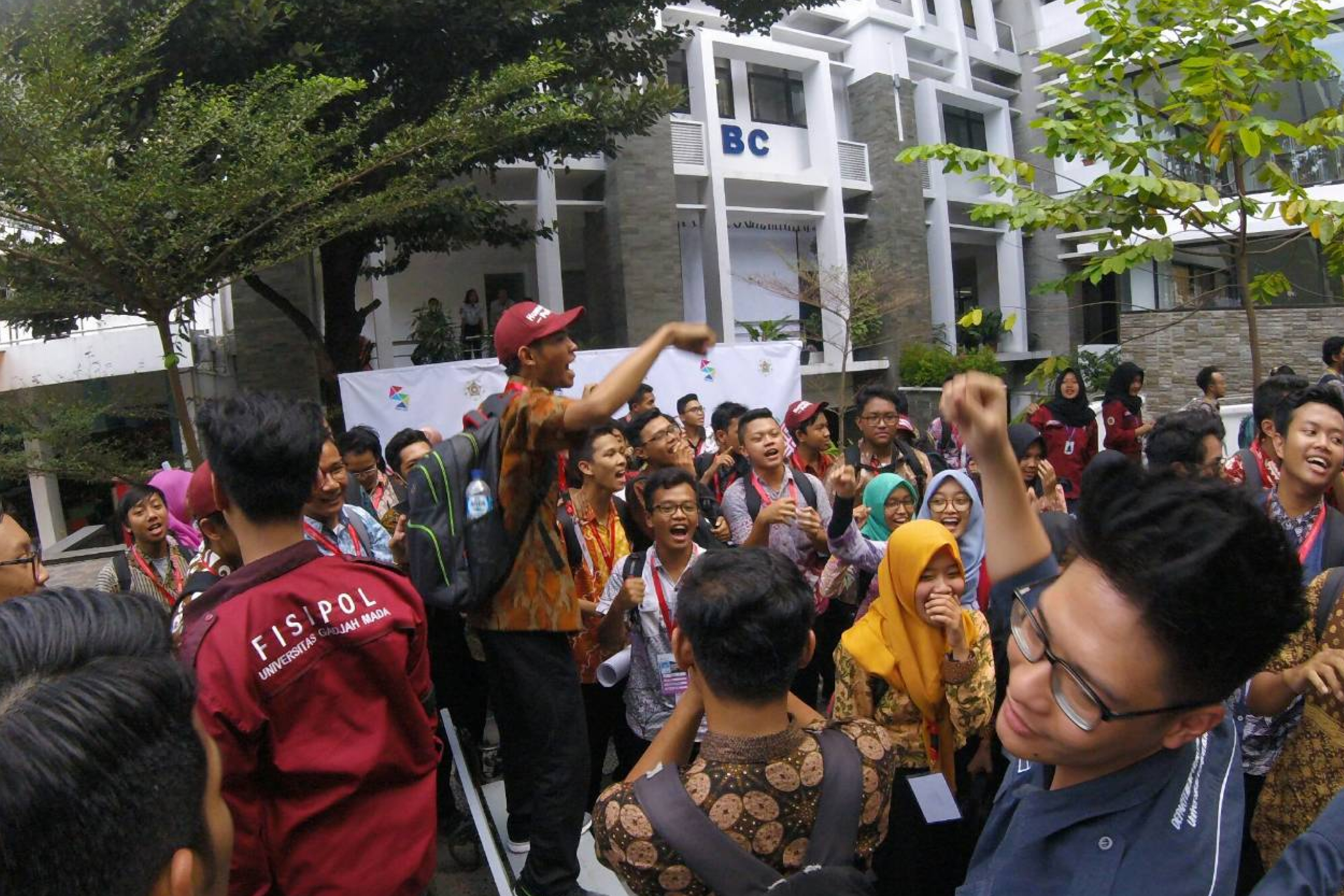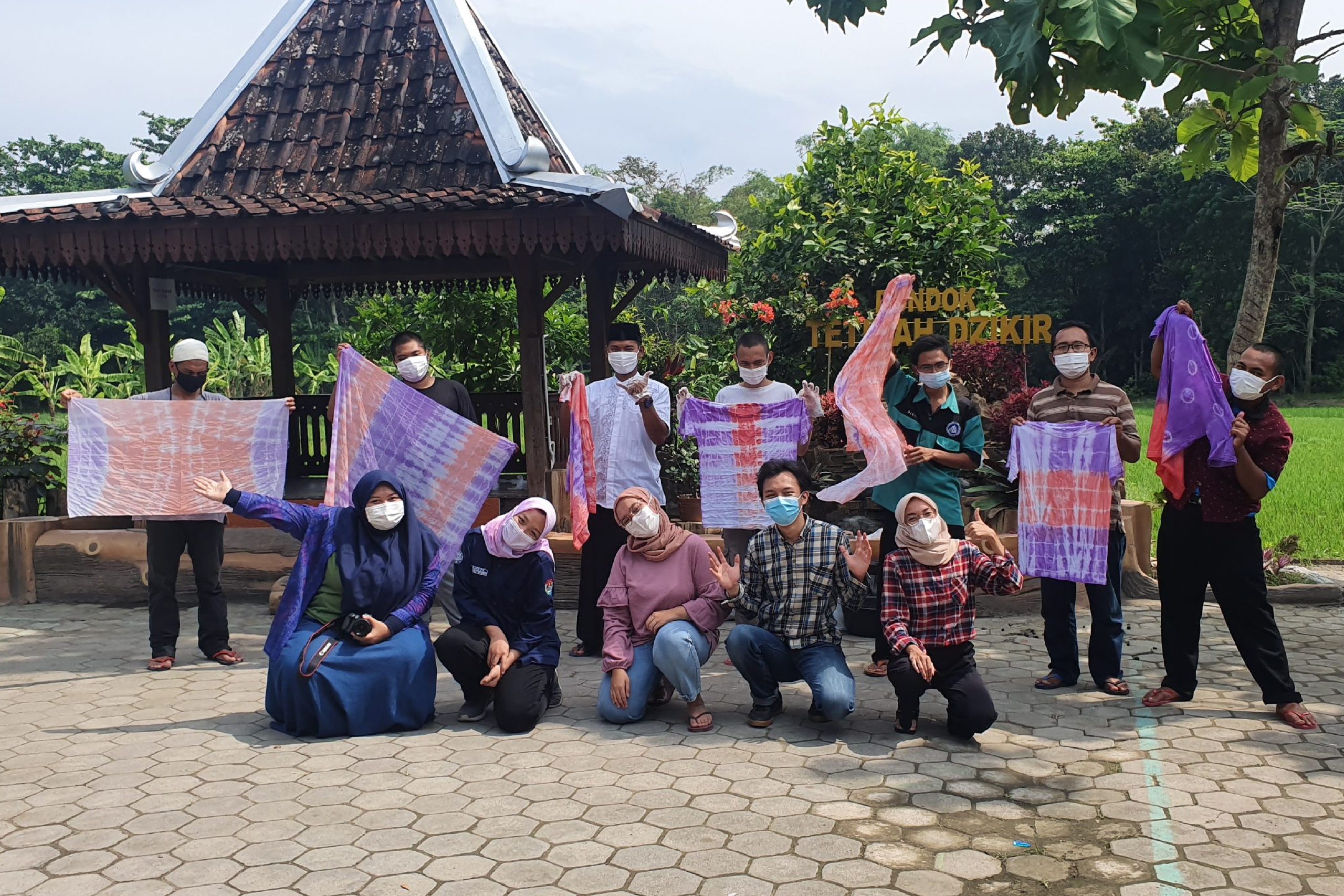UNDERGRADUATE PROGRAM / S1
Department of Politics and Government
Faculty of Social and Political Sciences
Universitas Gadjah Mada
Accredited by:

- Curriculum
- Academic Guide
- Student Activities
- Students Association
- Thesis
- Student Collaboration
- Complaint Service
- Graduation
Curriculums
The curriculum for the Bachelor Programme in Political Science and Governance (BPG) at UGM uses the 2016 curriculum, which is currently in effect. Students are required to enroll 144 credits during their studies period. The courses offered are semi-packaged and consist of compulsory and elective courses. Compulsory courses come from compulsory university courses, faculties, and departments. While the elective courses consist of interest in state studies, intermediary, community, and general electives.
Freedom to Learn-Independent Campus (MBKM)
Undergraduate Program in Political Science and Governance UGM has implemented “Freedom to Learn-Independent Campus” (MBKM) as one of the learning methods for students. MBKM is a comprehensive career preparation program as part of the policy of the Ministry of Education, Culture, Research, and Technology of the Republic of Indonesia. Through the MBKM scheme, students can gain knowledge, experience and skills outside of conventional learning methods. There are several programs offered in MBKM, including:
INTERNSHIP
The MBKM Internship Program enables students to carry out internships in institutions engaged in political science and/or government science in order to reflect on the theory they have learned in class. In addition, students can also take advantage of the knowledge and experience gained from internship activities to be included in a final project in the form of an internship thesis.
INDEPENDENT STUDY
The independent study program aims to provide opportunities for students to learn and develop themselves through activities outside the lecture class, but are still recognized as part of the lecture. This activity is carried out for one to two semesters and can be done independently or in groups to create innovative works, participate in departmental projects/activities or be involved in competitions at the national/international level.
RESEARCH
In the research program, students can participate in research projects at research institutions. Through this program, students can hone skills, gain experience and hone data analysis skills.
Indonesian International Student Mobility Awards
Students can study 1 semester at a university in another country to gain new knowledge and experience while living in another country.
Kampus Mengajar
Students have the opportunity to teach in elementary and junior high schools so that they can share their knowledge and provide inspiration for elementary and middle school students. Kampus Mengajar is one of the MBKM programs, which strives to offer students opportunities to learn and develop their potential outside of the classroom.
Membangun Desa (KKN Tematik)
Students have the opportunity to contribute to the development and empowerment of rural communities, as well as to learn directly from the community.
Pejuang Muda Kampus Merdeka
This program provides space for students to apply their knowledge by collaborating with local governments, community leaders and religious leaders in the region.
Merdeka Student Exchange
Students can study at other campuses, as well as learn about the culture of the archipelago and build friendships with students at other universities.
Merdeka Entrepreneur
Students who have an interest in the world of entrepreneurship can increase capacity, gain experience, as well as build sustainable entrepreneurial innovation ideas.
Humanity Project
Through this program, students can develop humanitarian activities to address social issues.
The above programs such as research, activism, internships, achievements, which have been carried out by students can be claimed as semester credits through a recognition scheme. This mechanism opens up opportunities for off-campus student activities to be equalized in credits.
Study Plans
Requirements for filling out Study Plans are:
- Students complete the registration requirements
- Students has filled out the lecturers surveys (EDOM)
- Students fill out KRS according to the schedule determined by the Academic Section of the Faculty
- All active students are required to fill out the KRS including taking the thesis.
Study Plan Guideline
The steps for doing KRS at the sismaster can be seen in the following video, KRS Guide for UGM Fisipol Students
Evaluation and Grading
Exam
- Exams are held twice in one semester by the Faculty, namely the mid-semester examination (UTS) and the final-semester examination (UAS).
- In the beginning of semester, the lecturer will determine the exam’s form and mechanism
- Assessment of learning outcomes is carried out by lecturers which includes accumulated test scores (mid and final of semester), activity in class, assignments, discipline, and academic honesty.
- The determination of the weight of each component is left to the lecturer in charge of the relevant subject.
Grading Indicator
Students’ final grades will be submitted in the form of letters and numbers with an explanation of the quality and weights contained as follows:
Grading Transparency
The grade complaint mechanism is adjusted to the learning contract in each course. If there are things that need to be communicated and further confirmed, please contact the lecturer directly. Students have two weeks to ask for transparency regarding their grade to the related lecturers. If students do not get respond from the lecturers, they may contact the Secretariat of Undergraduate Program for an alternative.
Lecturer Assessment Indicator
Student Leave
Academic leave is a state of not being registered as a student of the Faculty of Social and Political Sciences, Gadjah Mada University, for a maximum of two consecutive semesters with written permission from the Dean or Chancellor.
Students are entitled to take academic leave during their study period. The conditions for taking academic leave must comply with the following conditions:
- In a state not registered as a Fisipol student (have not paid BOP, SPP or UKT)
- The academic leave period does not exceed (or a maximum of) two cumulative and non-consecutive semesters
- If the requirements are met, leave permission is given by the dean. If it does not meet, leave permission is submitted to the Chancellor.
- Not entitled to receive academic services (thesis guidance)
- Conditions for submitting leave: a) being actively registered in the previous semester; b) pass a minimum of 30 credits with a minimum GPA of 2.00
- Leave procedure:
- The application letter is submitted to the Dean with the approval of the supervising lecturer and study program manager
- Leave is submitted no later than 2 weeks before the re-registration period for the next semester;
- Academic leave is not calculated in relation to study time
- During the academic leave period, the student concerned is not required to pay tuition fees and other fees
Fieldtrip
Fieldtrip is a learning activity by conducting field visits to non-governmental organizations and government institutions in accordance with the subjects and learning objectives for students.
Non-governmental organization
The field trip method enables students to be directly involved and participate in the activities of non-governmental organizations and to interact with the local diversity that students encounter. Some of them, students have taken field trips with Lingkar Organik, Farmers Groups at Tirtosari, Open Page Libraries, and others.
Government Institutions
The field trip method gives students the opportunity to meet government actors in carrying out their duties and functions. Some of them students have had the opportunity to interact and participate in the activities of the Yogyakarta City KPU, DPRD DIY, and others.
Public Lecturer
Not only learning from the classroom, public lectures enable students to learn about current issues and practices through resource persons who are experts in their fields. Public lectures broaden the scope of student learning beyond existing courses and provide opportunities for students to interact with these practitioners. Some examples of public lectures that have been held are “Sociopreneurship: Empowering Community through E-Commerce Innovation” with Bukalapak’s Founder, Achmad Zaky, and “Big Data and Its Role in Electoral Politics in Indonesia” with Rustika Herlambang, Director of Communications Indonesia Indicator.
Guest Lecturer
Guest lecturers are an effort to channel field knowledge exclusively from practitioners in their fields to students by using discussion methods to question and answer. The presence of guest lecturers makes the discussion in lectures more in-depth. Guest lecturers who often become resource persons in lectures, for example the village head.
Financial Aid
Competition Incentive Claim
For undergraduate students who have achieved achievements at the provincial to international levels, they can claim competition incentives by following the following methods:
- Login to your Simaster account at simaster.ugm.ac.id and select the “Student Activity” sub menu on the “Student Activity” menu
- Click “Add Activity” then select “Achievement” (The Champion) and select “Championship/Competition”
- Complete the achievement claim data then click “Save Activity”
- Select “Submit Achievement” and click “Yes”
- Wait for the data to be verified by the officer until the status changes to “Data Received”
- Apply for incentives by clicking “Change Incentives”
- Complete the data and wait until the incentives are given to students
WhatsApp Sub-Directorate of Student Creativity can contact 0822-4334-6611
Source of information: UGM Advocacy Forum
| NO | Event | Student | Study Program | Location |
|---|---|---|---|---|
| 1 | Indonesia Management Student Conference | Rosemeini Heraningtyas | DPP | Univestas Hasanuddin Makasar, 6-12 Februari 2017 |
| 2 | Apresiasi Penghargaan Juara Satu Kegiatan Kompetisi PUBLIC REALTIONS | 1. Harry Cahyono 2. Esty Nadya R 3. Putri Cahyaningtyas | DPP | Universita Katholik Widya Mandala Surabaya, 30 Maret-1 April 2017 |
| 3 | The 6th NIDA Summer Camp 2017 | Irwan Harjanto | DPP | National Institude of Development Administration, Bangkok, Thailand, 12-21 Juni 2017 |
| 4 | The 14th Hokkaido Indonesian Student Association Scientific Meeting – HISAS 2017 | Joko Susilo | DPP | Hokkaido University Japan, 18-19 Desember 2017 |
| 5 | Southeast Asia Leaders Summit (SEALS) 2017 | A. Naufal Azizi | DPP | Ruang Auditorium Gedung Nusantara V BDPD/DPR/MPR RI, 11-Apr-17 |
| 6 | Coll for Conference Goverment Fiesta ( Goviesta 2017 ) | 1. Aldiego Adhi M 2. Daniel Andara K | DPP | Aula LKPP Fakultas Ilmu Sosial dan Ilmu Politk Universitas Hasanudin, 19-24 Marret 2017 |
| 7 | Southeast Asia Leaders Summit (SEALS) 2017 | Farahita Nandini | DPP | Ruang Auditorium Gedung Nusantara V BDPD/DPR/MPR RI, 11-14 April 2017 |
| 8 | Yuth Student Delegates – ADFEST 2017 | 1. Purnomo Arief 2. Elrepyan Upadio | DPP | The Pattaya Exhibition and Convention Hall Pattaya, Thailand, 23- 27 Maret 2017 |
| 9 | Kompetisi Debat Pekan Raya 2017 | 1. Jefri Andika Pakpahan 2. Mohammad Idham Barieq 3. Tantri Fricilla Ginting | DPP | Gedung G dan I Kampus PKN STAN Bintaro, Tanggerang 31 Maret-2 April 2017 |
| 10 | Southeast Asia Leaders Summit (SEALS) 2017 | Ahmad Naufal Azizi | DPP | Jakarta, Indonesia, 11 – 14 April 2017 |
| 11 | Southeast Asia Leaders Summit (SEALS) 2017 | Farahita Nandini | DPP | Jakarta, Indonesia, 11 – 14 April 2017 |
| 12 | “Debat Politik Mahasiswa Tingkat Nasional Ke-3” | Oktafia Kusuma Sari Defila Priana Falamira Mawaddatusoliha | DPP | Universitas Negeri Semarang, 19 – 21 Mei 2017 |
| 13 | ASEAN YOUTH SUMMIT 2017 (Model Asean Meeting) | Oktafia Kusuma Sari | DPP | De La Salle University Manila,Philippines, 24 – 27 April 2017 |
| 14 | International Student Cultural and Program | Rostya Septiana Putri | DPP | Singapura – Malaysia, 9 – 12 Juli 2017 |
| 15 | International Student Cultural and Education | Aliyah Almas Saadah | DPP | Singapura – Malaysia, 9 – 12 Juli 2017 |
| 16 | The 14th EASP Annual Conference 2017 | Irwan Harjanto | DPP | Nagoya University, Nagoya, Japan, 1 – 7 Agustus 2017 |
| 17 | ASEAN YOUTH LEAD Exchange Program 2017 | Aliyah Almas Saadah | DPP | Chulalungkorn University, Thailand, 30 Juli – 7 Agustus 2017 |
| 18 | International Conference on Education, Psychology and Social Sciences 2017 (ICEPSS 2017) International Research Enthusiast Society | Gigich Ilmy Falarima | DPP | Bulacan, Filipina, 1 – 3 Juni 2017 |
| 19 | CallFor Research Competition (CFRC) 2017 | Miftah Farid Mahardika | DPP | Gedung Teresia FISIP Universitas Atma Jaya Yogyakarta, 18 Mei – 16 September 2017 |
| 20 | The 5th ASEAN Future Leaders Summit | Dicky Adra Pratama | DPP | Malaysia & Thailand, 31 Juli – 13 Agustus 2017 |
| 21 | XIX world Festival of Youth and Student 2017 | Rostya Septiana Putri | DPP | Sochi, Rusia, 12 – 23 Oktober 2017 |
| 22 | Future Leaders Summit (FLS) 2017 | Cut Khairina Rizky | DPP | Semarang, Indonesia, 9 – 10 September 2017 |
| 23 | ” Immerse in the Culture and Experience the Exchange” | Pungky Erfika Suci | DPP | Chulalongkorn University dan Silpkorn University, Bangko, Thailand, 18 – 21 November 2017 |
| 24 | World Festival of Youth and Student 2017 | Rut T.Simanjuntak | DPP | Sochi, Rusia,14 – 23 Oktober 2017 |
| 25 | The 5th ASEAN Future Leaders Summit | Dicky Adra Pratama | DPP | Malaysia & Thailand, 1 Juli – 13 Agustus 2017 |
| 26 | “Lomba Debat Nasional Social Political Competition (DSPC) 2.0” | Mawaddatush Sholiha Defila Priana Falamira Oktafia Kusuma Sari | DPP | Universitas Dipnegoro, 28 -19 Oktober 2017 |
| 27 | The 13th International Conference on Humanities and Social Sciences | Maria Angelica Christy Aka | DPP | Faculty of Humanities and Social science, Khon Kaen University, Thailand, 2 – 3 November 2017 |
| 28 | Commonwealth Youth Conference | Dicky Adra Pratama | DPP | Cyberjaya,Malaysia, 3 – 5 November 2017 |
| 29 | Lomba Debat Pendidikan Tingkat Mahasiswa Se – Indonesia | Ikhlasul Affa Defila Priana Falarima Mawaddatush Sholiha | DPP | UIN Syarif Hidayatullah Jakarta, 13 -14 November 2017 |
| 30 | Kompetisi Ilmiah Mahasiswa Nasional ke 3 | M Ikhlasul Affa Defila Priana Falamira Mawaddatush Sholoha | DPP | Gedung G2 Fakultas Ekonomi Universitas Negeri Surabaya, 3 – 4 November 2017 |
| 31 | The 13th International Conference on Humanities and Social Sciences (ICHUSO) | M.Dimas Ponco Wirianto | DPP | Khon Kaen University,Khon Kaen,Thailand, 02 – 03 November 2017 |
| 32 | Lomba Debat Bahasa Indonesia (LDBI) Padjadjaran Social and Political (PSP) Days | Rostya Septiana Putri Mawaddatush Sholiha Oktafia Kusuma Sari | DPP | Gedung Fakultas Ilmu Sosial dan Politik (FISIP) Universitas Padjadjaran, 01 -02 Desember 2017 |
| 33 | Diponegoro Social Political Competition | Mawaddatush Sholiha | DPP | FISIP Universitas Diponegoro, 27 – 29 Oktober 2017 |
| 34 | “Immerse inthe Culture and Expeience the Exchange” | Pungky Erfika Suci | DPP | Silparkom University dan Chulalongkom Universit,Bangkok,Thailand, 18 – 21 November 2017 |
| 35 | Call for Conference Government Fiesta ( Goviesta 2017 ) | 1. Putri Intan Rengganis 2. Pungky Erfika Suci | DPP | Aula LKPP Fakultas Ilmu Sosial dan Ilmu Politk Universitas Hasanudin, 19-24 Maret 2017 |
| 36 | ( Call for Paper ) The 6th NIDA Summer Camp 2017 | Irwan Harjanto | DPP | Bangkok, Thailand, 12 -21 Juni 2017 |
| 37 | “Kompetisi Debat Nasional Pilar Politik 2017” | Aliya Almas Saadah Muhammad Subhi Adzimi Rostya Septiana Putri | DPP | FISIP UIN Syarif Hidayatullah Jakarta, 16 – 19 Mei 2017 |
| 38 | Ekspedisi Nusantara Jaya | Dicky Adra Pratama | DPP | Tanjung Rhu, Bengkalis, Riau, 13 – 24 September 2017 |
| 39 | 4th Bangkok Internasional Conference on Social Science & Humanities (ICSSH) | Maria Angelica Christy Aka | DPP | Kasetsart University, Chatuchak, Bangkok, Thailand, 21 – 22 November 2017 |
| 40 | Commonwealth Yuoth summit 2017 | Dicky Adra Pratama | DPP | Malaysia, 03 – 05 November 2017 |
| 41 | Indonesian Debate Competition-Pekan Politik Kebangsaan 2017 | 1. Alfah Bagus P.E.I 2. Joko Susilo | DPP | Universitas Andalas Padang,Sumatera Barat, 01-03 Maret 2017 |
| 42 | Asean Youth Summit 2017 | Oktafia Kusuma Sari | DPP | De La Salle University Manila,Philippines, 24-27 April 2017 |
| 43 | International Conference in Humanity-The International Student Festival in Trondheim (ISFiT) Noeway 2017 | Aliyah Almas Saadah | DPP | Norwegian University of Science and Technology (NTNU), 9-19 Februari 2017 |
| 44 | Singapore 25 th International Conference on Business,Economics,Sosial Science and Humanities (BESSH) 2017 | Eni Khusnawati | DPP | Hotel Grand Pacific Singapore, 13-14 Januari 2017 |
| 45 | 4 th International Conference on English Literature and Humanities (ELH-2017) | Gigich Ilmy Al Bonadi | DPP | Kyoto,Jepang, 20-21 April 2017 |
| 46 | Call for Conference Goviesta 2017 | 1. Anisyah Nur Ismayaputri 2. Linda Br Ginting | DPP | Universitas Hasanuddin Makassar, 19-25 Maret 2017 |
| 47 | Southeast Asia Leaders Summit (SEALS) 2017 | Farahita Nandini | DPP | Jakarta, 11-14 April 2017 |
| 48 | Southeast Asia Leaders Summit (SEALS) 2017 | Ahmad Naufal Azizi | DPP | Jakarta, 11-14 April 2017 |
| 49 | Call for Conference Goviesta 2017 | R.Wira Asmara Ganda | DPP | Universitas Hasanuddin, 19-25 Maret 2017 |
| 50 | Call For Conference Goviesta: Polemik Penyelenggaraan Pilkada Serentak | 1. Aldiego Adhi Makaysa 2. Daniel Andara Kalangie | DPP | Gedung Fakultas Ilmu Sosial dan Ilmu Politik Universitas Hasanuddin Makassar, 19 Maret – 25 Maret 2017 |
| 51 | Call For Conference Goviesta: Polemik Penyelenggaraan Pilkada Serentak | 1. Putri Intan Rengganis 2. Pungky Erfika Suci | DPP | Gedung Fakultas Ilmu Sosial dan Ilmu Politik Universitas Hasanuddin, 19- 25 Maret 2017 |
| 52 | Call for Conference, Goverment Fiesta (Goviesta) 2017, Polemik Penyelenggaraan Pilkada Serentak | 1. Putri Intan Rengganis 2. Pungky Erfika Suci | DPP | Aula LKPP Fakultas Ilmu Sosial dan Ilmu Politk Universitas Hasanudin, 19-24 Maret 2017 |
| 53 | International Student Cultural and Education | Miera Ludfia Islamy | DPP | Singapore-Malaysia, 9-12 Juli 2017 |
| 54 | Kompetisi Debat Pendidikan Tingkat Mahasiswa Se-Indonesia 2017 | Ayuseptiani Asari Putri Muhammad Subhi Adzimi | JPP | Gedung Fakultas Ilmu Tarbiyah dan Keguruan UIN Syarif Hidayatullah Jakarta, 01-02 Januari 2017 |
| 55 | SIMBIZ 2017 | Alfath Bagus Panuntun E.I | JPP | Binus University International, 13-15 Januari 2017 |
| 56 | Lomba Debat Nasional | 1. Ahmad Naufal Azizi 2. Muhammad Subhi Adzimi | JPP | Ruang Aula FIK UNP, 02-03 Maret 2017 |
| 57 | Indonesia Management Student Conference | Rosemeini Heraningtyas | JPP | Universitas Hasanuddin Makassar, 8-12 Februari 2017 |
| 58 | Youth Organization as The Informal Sourch of Cadre In Political Party: Case Study Partai Kebangkitan Bangsa(PKB) in Kebumen Regency,Indonesia | 1. Eni Khusnawanti 2. Waode Siti Mukmin | JPP | Berjaya Times Square Kuala Lumpur,Malaysia, 27-28 Maret 2017 |
| 59 | Political Strategy on Borders Areas in Indonesian to Combat Human Trafficking | Gigich Ilmy Al Bonadi | DPP | Kyoto,Jepang, 20-21 April 2017 |
| 60 | Internasional Conference on Indonesian Development | Surya Ilham | DPP | Erames University Rotterdam , Notherland , 19 – 21 September 2019 |
| 61 | “Kompetisi Karya Tulis Ilmiah Nasional Pekan Politik ” Universitas Negeri Andalas | Bagus Wicaksono Rahmayani Muhammad Fawwas Rifasya | DPP | Universitas Andalas, Limau Manis , Padang, 05 April 2018 |
| 62 | ” YOUCAN Social Expedition SUMBA 2018 “ | Rosemeini Heraningtyas | DPP | Kadi Roma,Wewewa Tengah,Sumba ,NTT, 23 – 28 April 2018 |
| 63 | Call for Paper : The 7thnNIDA Summer Conference | Ruth T. Simanjuntak | DPP | National Institut of Development Administration,Bangkok, Thailand, 11 – 20 Juni 2018 |
| 64 | Fition ( FISIP INTELLECTUAL COMPETITION ) 2018 | Ramadhanti Firmaningsih | DPP | Laboratorium Pariwisata Fisip Universitas Riau, 04 – 07 April 2018 |
| 65 | Kompetisi Inovasi Kebijakan Publik National Governance Days HIMA Ilmu Pemerintaha FISIP Unpad | Muhammad Rilo Nugroho Adolfus Frederick Nova Widia | DPP | Universitas Padjajaran ,Bandung, 08 – 11 Mei 2018 |
| 66 | Kompetisi Debat nasional IPDN 2018 | Aliyah Almas Sa’adah Muhammad Subhi Adzimi Rostya Septiana Putri | DPP | Gedung Ksatrian IPDN Kampus Sumedang, Jawa Barat , 03 – 06 April 2018 |
| 67 | Kompetisi Tari Tingkat Intenasional Etoiles De Paris International Competition | Rostya Septiana P | DPP | Europen Association of Folklor Festivals ( EAFF ) , 03 – 06 Mei 2018 |
| 68 | Lomba Karya Tulis Ilmiah Nahasiswa Nasional “Pekan Politik V Universitas Andalas” | Dikki Apriyanto Khairul Hasbi Kevin Hendrika Septi | DPP | Fisip Kmpus UNAND Limau Manis,Kota Padang , 02 – 07 April 2018 |
| 69 | The 4th World Conference on Women’s Studies 2018. ” Women’s Studies : Gendered Scholarship,Activsm,and storytelling for a sustainable planet “ | Anastasia Imelda C. | DPP | Taj Samudra Colombo, Sri Lanka, 03 -05 Mei 2018 |
| 70 | Tsinghua Univercity International Summer Schol | Rachmadita Kusumastiti | DPP | Tsinghua Univercity,Beijing,RRT, 15 – 28 Juli 2018 |
| 71 | Youcan Social Expedition Sumba, NTT 2018 | Nur Rizki Alimin | DPP | Sumba, NTT, 23 – 28 April 2018 |
| 72 | Youth Connect on Entrepreneurship ( YOUCEO ) Malaysia – Singapore | Adhika Trisliantama Mimbar Danu Wijaya | DPP | Malaysia – Singapura, 05 -07 Agustus 2018 |
| 73 | ” YOUCAN Social Expedition SUMBA 2018 “ | Sovia Anjani | DPP | Sumba, NTT, 23 – 28 April 2018 |
| 74 | ” YOUCAN Social Expedition SUMBA 2018 “ | Isna Nur Fajria | DPP | Sumba, NTT, 23 – 28 April 2018 |
| 75 | International Conference on Innovation in Globlal Business, Social Sciences & Economic (IGBSSE-2018) | Dzikrina Azkia Navitri | DPP | Hi Seoul Youth Hostel Seoul, South Korea 5-6 Oktober 2018 |
| 76 | International Conference on Innovation in Globlal Business, Social Sciences & Economic (IGBSSE-2018) | Hilmy Indrasto | DPP | Hi Seoul Youth Hostel Seoul, South Korea 5-6 Oktober 2018 |
| 77 | International Conference on Innovation in Globlal Business, Social Sciences & Economic (IGBSSE-2018) | Gendis Syari Widodari | DPP | Hi Seoul Youth Hostel Seoul, South Korea 5-6 Oktober 2018 |
| 78 | International Conference on Innovation in Globlal Business, Social Sciences & Economic (IGBSSE-2018) | Anastasia Imelda C. | DPP | Hi Seoul Youth Hostel Seoul, South Korea 5-6 Oktober 2018 |
| 79 | ASEAn Student Forum (ASF) 2018 | Dicky Adra Pratama | DPP | Universiti Teknologi PETRONAS, Perak, Malaysia |
| 80 | YouCan: Youth Center to Act for Nation | Gigich Ilmy A.I.B | DPP | Atambua- Nusa Tenggara Timur, 6-11 Februari 2018 |
| 81 | 252018 Conference : Re-thinking Region In Global International Relation | Anastasia Imelda C. | DPP | Ateneo De Davao 23-24 Maret 2018 |
| 82 | Initiative for Peace (IFP) Cambodia Conference 2018 | Dicky Adra Pratama | DPP | Phnem Penh, Kamboja : 12-16 Februari 2018 |
| 83 | International Conference on Social Policy in The Islamic World 2018 | Nur Rizki Alimin | DPP | Allameh Tabab’i University, Tehrn, Iran : 12 – 13 Mei 2018 |
| 84 | YouCan : Youth Center Act for nation | Farahita nandini | DPP | Atambua- Nusa Tenggara Timur, 6-11 Februari 2018 |
| 85 | ASIA Youth Volunteer Camp Malaysia 2019 | Nova Widia Wardani | DPP | Janda Baik Village , Pahang , Malaysia 3 – 6 Mei 2019 |
| 86 | 8 th Nida Summer Camp 2019 | Rachmadita Kusumastuti | DPP | National Institutos Development Administration ( NIDA ), Bangkok , Thailand , 30 Juni – 08 Juli 2019 |
| 87 | 8 th Nida Summer Camp 2019 | Krisanti Arni Dinda | DPP | National Institutos Development Administration ( NIDA ), Bangkok , Thailand , 30 Juni – 08 Juli 2019 |
| 88 | Kompetisi Debat Nasional FESTKA 2019 | Tiara Meldy | DPP | Universitas Negeri Malang , Jawa Timur , 26 – 28 April 2019 |
| 89 | Lomba Debat Nasional Diponegoro 4.0 Social Political Competition | Hanif Jati Pambudi | DPP | Universitas Diponegoro , Semarang , 25 – 27 Oktober 2019 |
| 90 | The Secon Irit’s Growch Leadership Program for Youth 2019 | Anggi Fitriani | DPP | Universitas Negeri Semarang, 24 – 25 Juni 2019 |
| 91 | Permohonan Dana Bantuan Kegiatan Lomba Debat Pilar Politik | Fandy Arrifqi Ikhsan Dwi P Jacinda Nuurun A | DPP | Himpunan Mahasiswa Ilmu Politik UIN Syarif Hidayatullah Jakarta; 25 – 29 November 2019 |
| 92 | YOUCAN Empower for Nation Chapter Sabang 2020 | Putri Intan Rengganis | DPP | Kab. Sabang (NAD), 10-16 Februari 2020 |
| 93 | YOUCAN Empower for Nation Chapter Sabang 2020 | Isnan Diyah | DPP | Kab. Sabang (NAD), 10-16 Februari 2020 |
| 94 | YOUCAN Empower for Nation Chapter Sabang 2020 | Putri Intan Rengganis | DPP | Kab. Sabang (NAD), 10-16 Februari 2020 |
| 95 | YOUCAN Empower for Nation Chapter Sabang 2020 | Isnan Diyah | DPP | Kab. Sabang (NAD), 10-16 Februari 2020 |
| 96 | Apresiasi Juara I Kompetisi Konten Digital Tingkat Internasional “One Healt Workforce-next Generation Covid-19 Digital Awareness Challenge” | Raihan Naufal | DPP | Universitas Gadjah Mada, 06 November 2020 |
| 97 | Pengajuan Dana Apresiasi JUARA 1, Lomba Video & Animasi Badan pembinaan Ideologi Pancasila (BPIP) Tingkat Nasional | Danang Giri Sadewa (17/414906/SP/28033), Rayhan Naufal (17/413230/SP/27947) | PSDK & DPP | 26 Maret 2021- 2 Mei 2021 |
Korps Mahasiswa Politik dan Pemerintahan (KOMAP)
Korps Mahasiswa Politik dan Pemerintahan (KOMAP) is a departmental student association that is a forum for UGM DPP students to organize and have dynamics together. In KOMAP, students can practice leadership skills, work together, and be creative in arts and sports. KOMAP is also an advocacy tool for UGM DPP students.
Types of Undergraduate Thesis
There are two types of final assignments that S1 students of the Department of Governmental Politics can choose, namely:
Thesis Thesis is a scientific paper that is the student’s final project. This paper was preceded by scientific research, the results of which were then compiled into a thesis. Thesis writing has a credit weight of 6 credits.
Type of Thesis
- Scientific work which is a student’s final project, which is preceded by scientific research, with a stronger practical dimension than conventional thesis. There are several variations of the form of thesis work, namely:
- Journal Article Scientific writing compiled according to the rules of preparation of academic journals. This type of journal article thesis has a credit weight of 6 credits.
- Advocacy Products Theses
with a variety of advocacy products have three forms, including:
- Policy Paper Research results that focus on one particular policy issue and provide clear policy recommendations to policy makers. The policy paper has a credit weight of 3 credits.
- Academic Manuscript A scientifically justified manuscript concerning the conception containing the background, purpose of preparation, the objectives to be realized and the scope, scope, object, or direction of regulation of the draft legislation. Academic manuscripts have a credit weight of 6 credits.
- Documentary films/videos Non-story films/videos that combine elements of fact and the subjectivity of the creator. Documentary films/videos have a credit rating of 6 credits.
- Internship/Internship report
Guidance
During the lecture process, students will have intense communication with one academic Advisor (DPA). In this mentoring process, students can consult on various matters related to the academic process, such as filling out the KRS, determining the courses taken to designing the thesis they want to write. All the mentoring and consultation processes will be monitored in writing through the Academic Progress Monitoring System and Thesis Guidance Progress.
There are several ways that can be used by students to follow the mechanism of guidance and consultation with lecturers, namely:
- Following the schedule of guidance and consultation. Students can attend guidance and consultation according to a predetermined schedule if the supervisor in question already has a fixed schedule of guidance and consultation.
- Make an appointment in advance with the supervisor. This is intended if students want to follow guidance or conduct academic consultations with supervisors who do not determine a fixed schedule for guidance and consultation. Students can make time arrangements with lecturers via email, contact via telephone, or meet in person.
Thesis Guidance
The flow of thesis guidance for students who take theses is as follows:
- The department manager determines the mentoring for students who propose a thesis theme/title. The criteria for determining the supervising lecturer by considering several things include:
- The suitability of the thesis topic with the expertise
- Load for each lecturer
- Other criteria determined by the department
- The department issues a Thesis Supervisor Decree.
- The Guidance begins after the department issues a decision letter.
The mentoring process is monitored through a thesis progress monitoring book provided by the Academic and Student Affairs Section.
Research
Research is an important element in the student learning process, therefore the UGM Department of Politics and Government opens wide opportunities for students to collaborate in research activities carried out by the UGM Department of Politics and Government together with the Research Center for Politics and Government (PolGov). Some of the roles that are actively held by students are enumerators, transcriptors, and guides.
As enumerators, students have the opportunity to go out into the field and conduct interviews with resource persons under the guidance of PolGov researchers. As transcriptors, students are able to substantially participate in discussions and research interview results and write them down in text form to be processed into research data. Then, as a guide, students who have knowledge of research areas will go to the field and participate in a series of research with PolGov researchers.
Publication
In terms of publications, student involvement is wide open in making written works in the form of journals and books. Students can be involved through “Call for Paper” and/or final project submission in the form of a thesis by fulfilling the following conditions:
Call for Paper: UGM PolGov Journal
Writing theme:
- Socio-political movement
- Agrarian-land politics
- Elections and regional head elections
- other themes related to politics and governance in Indonesia
Writing conditions:
- Journal manuscripts must consist of a minimum of 4,000 words
- The manuscript has never been accepted or published in any journal
- The author is able to follow the publishing flow in accordance with the provisions of the PolGov Journal
Thesis
- The thesis of the work made by the author is a thesis in the form of a journal
- Recommended by thesis supervisor to be published in journal form
- Manuscript must be at least 4000 words
- The manuscript has never been accepted or published in any journal
- The author is able to follow the publishing flow in accordance with the provisions of the PolGov Journal
Media
Media is a means of communication between stakeholders within the Department of Politics and Government UGM which is manifested in the form of social media Instagram, Facebook, Twitter, YouTube, TikTok, to spotify “Ministry of Politics and Government UGM”. In its development, the media collaborated with student creativity in course assignments that were accommodated by the “Student Work” segment and collaborated in content creation.
Complaint Service
Students can submit critics, suggestions, and other needs related to the UGM Department of Politics and Government through:
Graduation Requirements
Students are declared to have passed the Undergraduate Program if they meet the following requirements:
- Have completed at least a number of 144-148 credits required
- a minimum GPA of 2.00
- The minimum required course value is C
- Number of credits with a D score of no more than 10% of the total credits total
- No score E
- Passed the thesis exam
Graduation Criteria
predicate is given in three levels, namely the highest level with predicate cum laude, middle level with very satisfactory predicate satisfactory. The graduation criteria for each predicate are as follows:
- With Compliments (Cum laude)
- GPA 3,51 or more.
- The maximum period of study that has been undertaken is 10 semesters.
- Very Satisfactory
- GPA 2,75 or more.
- No limit on course repetition
- Satisfactory
- GPA 2,50 – 2,74.
- No limit on course repetition
Authority to determine graduation with cum laude predicate, very satisfying, and satisfactory is determined by the Dean of the Faculty.
Data Entry and File Submit
Some of the graduate data needed in Data Entry at SIA Graduation are as follows:
- Writing name : adjusted to high school diploma (not all capital letters)
- Writing Place, Date of Birth : adjusted to high school diploma
- Entry
- date Date Graduated : Filled with the date of the
- GPA, credits adjusted to the transcript (see on the portal)
- Predicate:
- 00 – 2.74 : Satisfactory
- 75 – 3.50 : Very Satisfactory
- 51 – 4.00 : Cum Laude (Max. 5 Years Study Period)
- 51 – 4.00 : Very Satisfactory ( Study period more than 5 years)
- Filling in the names of the supervisors and examiners written in full with their titles. The first order: Advisor. Second and third order: Examiners.
- The title of the thesis in the revised title entry.
- All other data must be filled in completely.
Order of files to be collected:
- Black and white photo size 3 × 4 (2 sheets)
- Original KTM
- Proof of collection of Thesis CD from the UGM Library
- Certificate form free of libraries and others (signatures and stamps have been requested) and attachments from the Library
- Data of Graduates printed (2 sheet) and pasted 3 × 4 black and white photos.
- Diploma form, landscape printed (1 sheet) and pasted 3 × 4 black and white photos.
- KAGAMA Form 91 sheets and pasted 2 × 3 color photos (Blue Background)
- Copy of high school diploma (2 sheets)
- The title of the thesis in Indonesian and English
Graduation
Students can take care of and complete the administrative requirements for graduation at the Faculty if they have submitted their thesis. Students who do not submit thesis manuscripts are not entitled to attend graduation, obtain diplomas and transcripts.
Administrative requirements for graduation at the faculty include:
- Has been declared graduated by the Department
- Fill out the registration form for prospective graduates in the academic and student affairs section and complete other requirements contained therein.
- Students who have completed all graduation requirements at the faculty are then referred to as prospective graduates.
Graduation Ceremony
- Students who have been designated as prospective graduates are entitled to attend the graduation ceremony organized by the University.
- Prospective graduates who have not met all the administrative requirements set by the university and faculty are given the opportunity to attend graduation in the next period.
- Students who have attended the graduation ceremony will receive a diploma and a transcript as an attachment to the diploma.
Graduates who do not attend the graduation ceremony, diplomas, transcripts of grades, samir and other equipment are accepted at the Academic and Student Affairs Section of the Faculty of Social and Political Sciences UGM.

